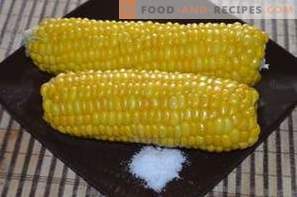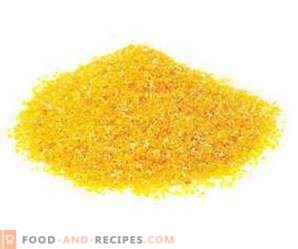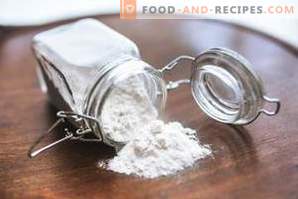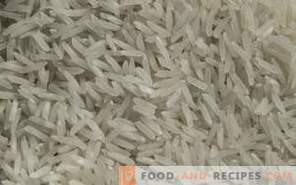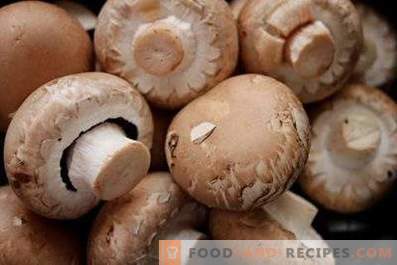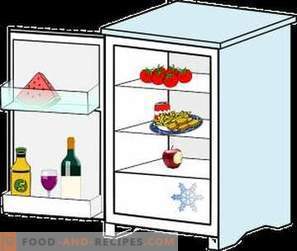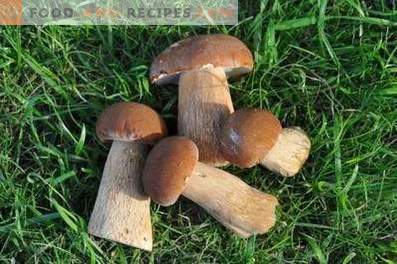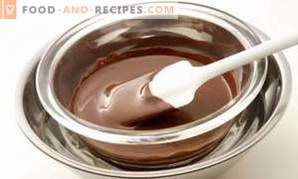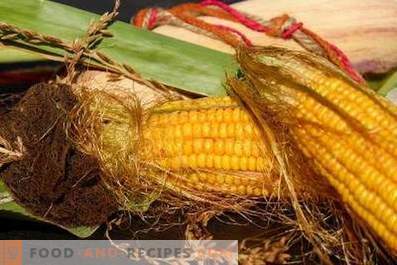
Corn is a useful and tasty product. With the right storage technology, you can enjoy superb cereal all year round.
Why store corn and how it is useful
The energy value of corn is very high. That is why for many nations, cereal is no longer valued for one millennium as much as we appreciate the main dish of our table - bread. In one cob of the product does not find a variety of vitamins and trace elements. And it is replete with unsaturated fatty acids that protect against insidious oncological diseases. Corn is good for the prevention of cardiovascular diseases. If you eat it regularly, your blood cholesterol will decrease, your blood vessels will become more elastic.
Also, grass promotes good digestion, improves metabolism, and is a sedative for the central nervous system. Corn oil cures liver and gallbladder disease. A decoction of hairs that surround the ear reduces blood sugar and pressure. Well, the product is also very low in calories, so it is boldly added to the diet on any diet for weight loss.
How to store corn and where, mainly depends on the type of grain:
- fresh;
- dried;
- frozen;
- sour.
Some time can be saved and boiled corn.
At home, the cereal is usually contained in a refrigerator or a special room where low humidity is maintained (this is how dried corn is stored).
Storing fresh cobs for the winter
Raw corn cobs can be saved all winter until spring. And it is possible to do this at home. The freezer compartment of the refrigerator will be quite enough. So:
- we clean the ears of the tassels and coarse leaves;
- we wrap each of them in cling film or folded in food bags, tightly closed;
- send in the freezer.
Raw cobs will winter without any problems and will delight all households with excellent taste in spring.
Dried corn storage
Dried corn is stored for many months. And later varieties and the longer. True, for man it is inedible and is suitable only for animals.
Cobs and grain dried separately. The first ones are suspended in a dry and dark place (connected in the form of braids or in pairs), and the grains are folded into fabric bags, food containers, or paper boxes. Dry corn storage humidity should be as follows:
- for cobs - 16%;
- for grains - no more than 13%.
But the temperature does not play a big role. Finding a place with the desired level of humidity in an apartment or a private house is quite a real task. For example, a mezzanine or attic.
Store boiled cobs
Hot, freshly cooked cobs tastes best. So that the corn does not cool down after cooking, just do not take it out of the water, and wrap the pan with some kind of warm blanket. Then the grass will be hot for 2-3 hours. Wrapping with foil is another way to prevent the freshly cooked product from cooling immediately.
Cooled boiled cobs spoil very quickly (literally in a few days). So that they remain edible longer, you need to do one of two things:
- Remove them from the water, wait until they cool down, then wrap them in plastic wrap, and finally send them to the refrigerator. They can be eaten for 2-3 days, but not longer.
- Put in the fridge right in the pan, in which the corn was boiled. Edible cobs will remain a maximum of three days.
Storage of boiled grains
Grains alone can be saved just incredibly long. There are two interesting ways to do this.
The first way:
- Boil cobs.
- Carefully cut the grain.
- Fold them in banks to the top.
- Pour boiling water with salt (a teaspoon of salt is put in one liter of water).
- Send to the fridge.
In this form, boiled grains will not spoil for three months. But a few weeks after the start of storage, it is necessary to add salt water to the jars, as the corn absorbs part of the salt.
The second way:
- Lower the cobs a couple of times alternately, first into hot water and then into cold water.
- Dry.
- Separate the grain.
- Fold the corn into airtight plastic bags and send in the freezer.
In this form, the product can be stored up to one and a half years. Corn preserves its usefulness and pleasant taste.
Thawed grain should be used immediately. Re-send them to the freezer can not be: the product becomes harmful to the stomach.
Storage of canned corn
Unopened store tins with corn grains save easy. It is enough that the temperature in the room where they are placed is not higher than +25 degrees, and the humidity is at most 75%. The standard shelf life of such canned food is three years.
In the open bank, corn kernels quickly sour and deteriorate. Even in refrigerator conditions, they can be stored for no longer than three days. And only in plastic or glass containers. In the “tin” the product will lose its freshness literally on the opening day. That is why immediately after uncorking a can of corn kernels, it is customary to pour. Canned pickle does not need to be drained - without it, the grains will become inedible even faster. Interestingly, the home canned corn remains for up to 3 years (in cellars and cellars). But the store still undiscovered canned spoil after two years. And all the same metal is to blame for this, because of which the grains are oxidized faster than in the case of glass or plastic containers.
Store the fermented (soured) corn
There is no sour grass, but it is useful for fishing. Crucians, carps and other small fish on the fermented grains perfectly peck. It’s not difficult to preserve such corn - you just need to put it in the fridge, that's all. Well, unless you have to take care that the storage container is sealed, otherwise the other products will soak up the unpleasant smells of “sour”. Peck on the fermented corn fish will be three weeks, and then for these unpretentious creatures, it will become unattractive.
Corn is tasty and very, very useful. It doesn’t hurt to save it for a bit in order to enjoy a pleasant taste not only in summer, but in autumn and winter.




